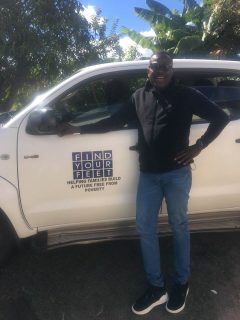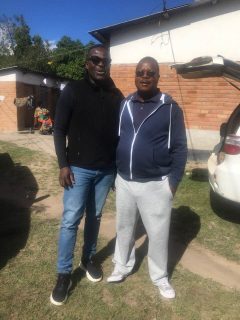Day #14 – June 14, 2019
“Of internet access & roaming gymnastics: evening the global playing field.”
By A. Kusi-Appiah, 2019 Queen Elizabeth Scholar, Carleton University.
Part 1
- Introduction:
June15th, 2019 marks the 14th day of my arrival here in the warm heart of Africa, and I am not disappointed. The weather is gorgeous and the vegetation is lush/green with lots of trees for the production of oxygen for human consumption. Such ideal relief, vegetation and weather conditions affords me the privilege of performing my daily jogging/walking the hills of Mzuzu. Most importantly, the *people* here are just indescribably awesome. Needless to say I couldn’t have chosen a better environment to conduct a social research – kudos to my advisor, Dr. Paul Mkandawire and of course my host in Mzuzu, Dr. Singini for guiding me thus far. I have also enrolled in a yoga class at the Skyway University with one of the best instructors in Alex, a veteran who knows how to get the best out of his charges.
- Scoping complete:
So here I am working relentlessly at the task at hand – research assistants/interpreters have been selected and briefed about the nature of my research and they have also familiarized themselves with the six (6) study areas of my research namely: a) Lower Zolozolo, b) Chibavi, c) Masala, d) Kaboko, e) Mzilawayingwe and f) Area 1B. These are areas in Mzuzu city that exhibit periurban characteristics.
Periurbanism is the consequence of one of the three population processes within the urban space (fertility, mortality and migration), which are in turn the result of individual decisions undertaken in a sociocultural, economic, political and environmental context. One consequence of these processes is the uneven incorporation of a variety of institutional forms into the larger cultural environments. The city of Malawi generally exhibits a complex display of a mixture of both rural and urban characteristics throughout the city. Its residential neighbourhoods can be both described as rural and urban at the same time. There are residential units that are comparable to those found in modern cities like Ottawa and Montreal that enjoy amenities such as electricity, pipe borne water supply provided by the municipality, and postmodern facilities such as high tech television networks fitted with wifi capabilities. Some of these residential units are ‘gated’ with 24-hour private security services. Contrasted with the above are residential units (sometimes sitting side by side the privileged residential units described above) and resembling what is usually seen in ghettos. Some of these poor units are without access to basic amenities like electricity or formal tap water sources. People living in such units mostly depend on informal sources for their water and electricity, at the minimum.
In this complex environment, I have been able to assemble a cadre of competent research assistants who will also double as interpreters of the local language (Tumbuka) into English. These research assistants/interpreters have also been made aware that interviews *will not* be done during this mobility period. One of the purposes of this mobility period is to do a reconnaissance of the study areas, and map it out for easy access during the next stage of the research process (i.e. data collection).
Part 2
 As part of the mobility period for the Queen Elizabeth Scholarship program, I have also gotten in touch with staff of the *”Find Your Feet”* NGO (FYF) in Malawi, thanks to the generosity of Mr. Chimwemwe Soko (executive director of FYF, Malawi). On June 10 2019, I met with the manager of programs of FYF in their office premises here in Mzuzu and a plan has been drawn up to cover the entire mobility period of my stay here in beautiful and scenic Mzuzu. The plan is to work with FYF on their programs which essentially are aimed at lifting marginalized families out of poverty and consequently helping them to live normal and productive lives, which in turn may transform the community and help tackle the scourge of climate change caused by human activities. There will be visits to project sites and interactions with participants of their programs.
As part of the mobility period for the Queen Elizabeth Scholarship program, I have also gotten in touch with staff of the *”Find Your Feet”* NGO (FYF) in Malawi, thanks to the generosity of Mr. Chimwemwe Soko (executive director of FYF, Malawi). On June 10 2019, I met with the manager of programs of FYF in their office premises here in Mzuzu and a plan has been drawn up to cover the entire mobility period of my stay here in beautiful and scenic Mzuzu. The plan is to work with FYF on their programs which essentially are aimed at lifting marginalized families out of poverty and consequently helping them to live normal and productive lives, which in turn may transform the community and help tackle the scourge of climate change caused by human activities. There will be visits to project sites and interactions with participants of their programs.
In addition, I am co-teaching a couple of courses at the Department of Water at Mzuzu University, thanks to the hard work of Dr. Wales Singini (Director of Research) and to the generosity of Dr. B. Chunga of the Water department and Prof. James Gondwe of the Geography department. For the rest of this semester, I shall be teaching *Water Supply Management* (level 3) and *Environmental Impact Assessments* (level 4). I will be teaching these courses from the human/social perspectives. At the Geography department, I have already lectured a 3rd year class on, *”Periurbanism and its consequences*”. Periurbanism is arguably the most dominant urban form and spatial planning challenge of the 21st century. In older industrial or post-industrial countries the periurban is a zone of social & economic change and spatial restructuring, while in newer industrializing countries, and most of the developing world (Africa included) the *periurban* is often described as a zone of chaotic urbanization leading to *sprawl*. Malawi’s City of Mzuzu exhibits periurban characteristics. Parts of the city of Mzuzu are characterized by affluence and conspicuous consumption, while other parts of the same city, usually side by side with the affluent parts exhibit *dire poverty and social displacement* (see Ravermtz et al., 2013). This kind of landscape is pregnant with meaning, especially in the area of resource availability and accessibility. This is a landscape that keeps shifting and is in continuous flux and transition. (Ravetz et al., 2013).
I have also had my first class with the *Environmental Impact Assessments* (EIA) students on Friday June 14, 2019, and on Monday June 17 2019 I shall begin teaching *Water Supply Management*, with concentrations in water supply points and legislation.
It is an understatement to say that my work is cut out for me, but it is exciting and there has been no dull moment.
Part 3 – Internet roaming: a capitalist minefield/highway robbery?
In anticipation of internet issues prior to coming to Malawi, I brought ‘data’ worth 10 gigabytes from my internet provider in Ottawa, Canada. At the time of purchase (exorbitant if you ask me) I made it clear to the agent that I will be using the *data from hell* in Mzuzu while I am here (roaming) and if there is any problem he should tell me. In his calm/measured/supposedly polite Canadian accent, the agent told me without equivocation, and emphatically that I am: “free to use your purchased data anyhow you wish.” I took his words as gospel and I thanked him profusely and hung up the phone, also in a reciprocal Canadian accent and demeanour. I was content as I had been spared the horror of paying money I don’t have to an agency that does not deserve it (imagine how many boreholes could be dug with $17,000). I immediately started using the data I had used my hard earned $$ to purchase (data should never cost more than $10 for 10 gigabytes but I paid 100s of dollars for it) getting in touch with family (my darling twins are always happy to see Papa’s face on the other side of the phone many thousands of km away from my ancestral home). That gives me extra encouragement & motivation to ‘soldier on’ with the work of ‘redemption/emancipation’.
But that was short-lived when I received a call on June 12 from an agent of my internet provider in Ottawa indicating to me that I had accumulated a charge of $17,000 for using data on my phone since June 4, 2019 when I purchased 10 gigabytes of data. In this fraudulent regimen of dubious legality, I am to be charged $9.99 any time I use the data on my phone (read: data I have already purchased). In an equally calm Canadian-like tone, I indicated to the agent that this was a mistake and that they have to look into it and provide me with a better response as well as a transcript of all correspondence between myself and Rogers internet providers in Ottawa. The agent obliged to do so and promised to call me back. The following day (June 13 2019) I received a call back with the good news that *Rogers* Ottawa had indeed billed me in error since I had already purchased 10 gigabytes of data on June 4 2019 and the agent had already accepted that I could use my data in Malawi without any problem.
Relief, whew!!!!! But was the aggravation and stress worth it?
Should any human being have to suffer this kind of humiliation in order to *access* societal resources?
Why would any human entity go out of its way to exact a pound of flesh from his (it is usually a he) fellow human being where he had not sown?
What is the sanctity of human life worth?
So what is the issue here? At least even the European Union (yes Europe and Europeans have been the worst offenders when it comes to colonialism and exploitation of the ‘other’) has outlawed roaming charges with the rationale that it is *lawless and quite draconian* so why is North America not following suit? In my not-to-be-humble opinion, *roaming* charges must be illegal everywhere in this *globalized* world, for they can be characterized as ‘highway robbery’, or to put it another way, ‘roaming charges are equivalent to extortion’. Some of these capitalist practices (i.e. making money at all cost, even if it will harm the environment and/or human beings) are just not human friendly and making profit for its own sake must not ignore the human suffering that accompanies it. It is my humble submission that Sustainable development can only occur if the human factor is religiously adhered to and incorporated into all profit making plans. In this case it is clear that human rights are being trampled upon in the name of profit making by the so-called rationale economic ‘man’/wise entrepreneur in the internet market of North America. The good people of this world deserve better. There are noble and better solutions to mitigate against the ills of the onslaught of the capitalocene (quoting Donna Harawayi). We must not fail! We must sit up and oppose such inhumane practices.